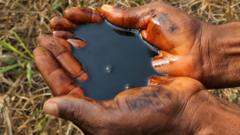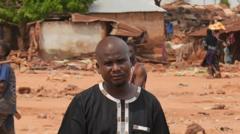Shell is under scrutiny following a BBC inquiry that highlights accusations of corruption and ineffective management of an oil spill clean-up project in Ogoniland, Nigeria. Despite pledges from both Shell and the Nigerian government to address environmental damage, evidence shows a systematic failure and neglect, prompting a civil suit from affected communities.
Shell Faces Allegations of Corruption Amidst Failed Oil Clean-Up in Nigeria

Shell Faces Allegations of Corruption Amidst Failed Oil Clean-Up in Nigeria
A BBC investigation reveals Shell's negligence towards repeated warnings about corruption and inefficiencies in the clean-up of oil pollution in Ogoniland, Nigeria, leaving communities to suffer lasting consequences.
A recent investigation by the BBC has shed light on alarming allegations against Shell regarding its management of oil spill clean-up operations in the Ogoniland region of southern Nigeria. Numerous claims suggest that the multinational corporation overlooked repeated warnings concerning the integrity of a clean-up initiative funded by oil companies worth $1 billion (£805 million). While both Shell and the Nigerian government have publicly maintained that efforts to remediate contaminated sites have been largely successful, underlying evidence reveals a starkly contrasting reality.
A whistleblower with insider knowledge characterized the clean-up operation as a "scam" that has not only squandered funding but also failed to alleviate the ongoing environmental devastation faced by the local Ogoni population, even over a decade after a pivotal UN report highlighted the critical situation in the area. Shell attributes the prevailing challenges in the Niger Delta to rampant illegal activities, such as oil theft, claiming that all spills from its facilities are promptly addressed.
The timing of these allegations coincides with an upcoming civil trial scheduled in London, where residents from two Ogoniland communities will demand accountability from Shell for pollution that occurred due to its infrastructure between 1989 and 2020. Those affected assert that such contamination has deprived them of clean water sources, hindered agricultural practices, and raised significant public health concerns.
Life in Ogoniland paints a grim picture. Residents like 37-year-old Grace Audi are dependent on contaminated water sources, forcing families to buy clean water amidst a backdrop of dire economic conditions. Paulina Agbekpekpe, another local, recalls the lush environment before the oil spills devastated her community, leading to severe health complications and the loss of family members.
The UN Environment Programme's 2011 report assessed the extent of pollution in Ogoniland, revealing that residents consumed water laden with known carcinogens, far exceeding safe levels, along with ongoing pollution in areas that Shell claimed to have remediated.
In response to the rampant allegations of fraud regarding the Hydrocarbon Pollution Remediation Project (Hyprep)—the agency responsible for overseeing clean-up efforts—an anonymous source reported pervasive misconduct, from the engagement of incompetent contractors to the fabrication of laboratory results. The implicated parties, including Shell, have remained largely unresponsive.
As Shell seeks to divest its Nigerian assets in favor of concentrating on offshore ventures, community members express deep skepticism regarding the potential effectiveness of any incoming operators. They fear continued exploitation of the region's oil reserves without adequate environmental responsibility or local benefit.
Amid widespread economic reliance on petroleum exports, Ogoniland's residents are left grappling with the consequences of oil production, claiming that while profits may flow to politicians, they are bearing the brunt of environmental destruction and diminishing livelihood options.




















